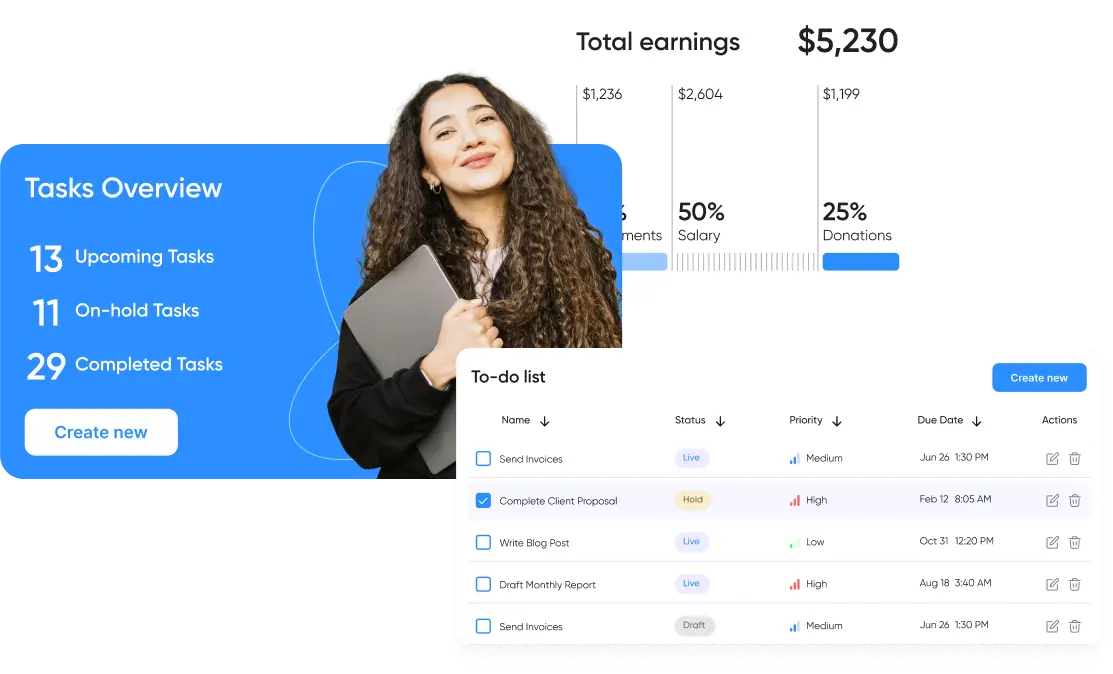Custom Software Development
Why Expense Management Software is Critical for Healthcare Providers [Top 7 Advantages for 2023]
Are you looking to prepare for the next wave of healthcare tech? Or have complete visibility into how your personnel spends their travel funds? Maybe, keep track of outstanding patient payments and hospital operating expenses to ensure your facility stays competitive?
If your answer is yes, investing in or upgrading your existing expense management software will be a wise business move.
Expense control can be tedious, but it remains crucial for ensuring the stable operations of your healthcare facility. Whether you’re running a small practice or a big hospital, managing employee expense reports, accounting, and billing, and making timely payments for medical supplies and software licenses are all part of maintaining staff and patient satisfaction.
Factor in the oncoming recession — when healthcare providers will need to cut costs while increasing efficiency to stay afloat — and it’s clear that consolidating all your systems into a cohesive medical cost management system is no longer a nice-to-have but a necessity.
After all, professional expense software solves one of the biggest pain points in healthcare — the tedium of expense reporting for clinicians — and means that doctors can better concentrate on what they do best: addressing patient needs.
“As we enter this time of heightened economic uncertainty, the ability to control costs from a healthcare perspective is going to become more and more important,” - Craig Kurtzweil, Chief Data & Analytics Officer, UnitedHealthcare.
ElifTech’s expertise in healthcare software development ranges from chatbots for patient-facing apps all the way up to complex enterprise resource planning (ERP) and healthcare information management systems (HIMS). This enables us to define the biggest impact areas for every project and maximize the value we bring to each customer solution.
In this article, we’ll give a brief overview of healthcare expense management software, some compelling reasons to invest or upgrade in 2023, and the features to look for once you’ve decided that a new solution is for you.
What is Expense Management Software in Healthcare?
Expense management software (EMS) is an enterprise-grade solution for monitoring, tracking, and processing all business-related expenses of medical personnel and clinicians. EMS solutions generally include the following functionality:
- Policy management for establishing, adjusting, and publishing company expense and reimbursement policies;
- Manual and automated forms for employees to submit receipts of business-related expenses;
- Virtual corporate credit cards for travel expenses and recurrent purchases (medication resupplies, software and hardware licenses, utility bills, etc.);
- Tools for monitoring ongoing expenditures, account receivables, and other financial transactions;
- Tools for reimbursing employees for business-related expenses;
- Integrations with other healthcare software.
This list is far from exhaustive, but these are the core features of an EMS. Depending on your domain and structure of operations, you might need other features too.
Ultimately, software for employee and technology expense management enables your personnel to spend more time serving patients and less time filling in routine employee expense reports, all while ensuring the ongoing stability and transparency of your operations.
Let’s delve deeper into the benefits a new EMS could bring to your organization.
Expense Management Software Benefits for Healthcare Providers
Chances are, you’re already using some form of an expense management solution to track your healthcare facility’s accounts. Yet many older and ad-hoc systems have weaknesses that handicap rather than enhance organizational productivity:
- Poor focus. Many solutions are not dedicated specifically to healthcare operations and regulatory requirements, which makes it more difficult for staff to work effectively.
- Poor future readiness. Older platforms are unable to keep up with advances in security, data privacy laws, and intelligent reporting.
- Limited integrations and scalability. Legacy platforms have usually grown with the organizations they serve. They may not integrate with new software or cope with increased traffic demands.
The good news is that a new expense management system can solve all of these problems. Here’s a closer look at the benefits you get when you upgrade.
Streamlined Data Collection & Organization
As a healthcare provider, you use several systems to support the day-to-day running of your facility. Examples are ERP, CRM, and accounting and billing software. Unless you use a suite of integrated products from a single vendor, the data produced by your systems will come in different formats and won’t be suitable for immediate use in analytics.
To overcome this problem, EMS tools integrate with the rest of your software ecosystem to ensure the data you obtain is actually usable. Such platforms streamline data collection, transform it into target formats, and can even intelligently organize your files. This way, instead of shuffling through piles of disparate reports, you get complete transparency into your expenses at a glance.
Process Automation & Reduced Errors
While receipt processing is essential for running a business, it’s also tedious and tricky. Doing it daily is a menial task that most staff hate. What’s more, the combination of tedium and necessary attention to detail can lead to errors in records which will have to be corrected down the line. Searching for errors when the numbers don’t add up is another unpleasant task.
The ability to automate receipt creation, filing, and approval is one of the most attractive features of medical expense management software. But it doesn’t just save time: it frees up your staff's energy so they can focus more on dealing with patients, not admin work.
Reduced Costs, Streamlined Reimbursement Processing, and Improved Cash Flow
Ongoing education and attendance at conferences and seminars are essential to keeping the skills of your staff honed. However, covering and reimbursing these expenses is a challenge. How can you know whether an expense outside of flights and accommodation is justified or excessive?
For example, suppose one of your doctors flies to an international conference and pays for the flight and hotel with a corporate card but pays for meals and amenities with a personal card. Combining all the statements into one report — not to mention double-checking the payments from the personal card — will be a headache for your financial department.
EMS tools solve this problem by allowing you to form financial policies and issue virtual corporate cards with predefined thresholds for payment size, timeframe, or even terminal type. Any expenses that don’t meet these criteria have to be approved by your financial department.
This way, your financial manager can approve or deny a request to reimburse an unexpectedly large expense outside of normal work hours, such as a restaurant bill. Dedicated software makes it easy for a staff members to justify the expense however they choose to pay.
Mileage expenses are another example, where point-to-point GPS mileage records for medication delivery can be submitted for reimbursement automatically. All employee expense records are centralized and organized, and the reimbursement process is straightforward.
Expense software also improves your bottom line due to the minimization of errors in reimbursement validation. The whole approach leads to streamlined financial operations with cost reduction across the board.
Improved Transparency & Accuracy
Donations, subsidies, and grants should all be spent according to predefined criteria to avoid litigation. Yet, with larger projects and distributed teams, it can be hard to keep track of all the finances coming from different sources and what the funds are spent on.
With expense management software, this task becomes much easier. You can create a virtual card for grant- or donation-related expenses. A quick look at the card’s transaction history gives you a transparent and accurate representation of all spending related to the grant or donation.
What’s more, by allocating fixed sums of money to specific and predefined virtual credit cards, you can plan budgets months in advance instead of having to comb through and deal with multiple reports at the end of the billing period.
Comprehensive Reports on All Financial Data
EMS tools give you comprehensive reports that can be sorted and filtered based on your inquiry. You can drill down into department, team, time period, or individual spending. This also allows you to combine multiple reports into an integrated analytics, charts, and actionable insights system.
This kind of healthcare business intelligence is crucial for doing more with fewer resources, minimizing time and effort wasted, and helping your teams be more productive.
Improved Compliance with Regulations & Guidelines
All healthcare organizations must comply with multiple guidelines, acts, and regulations. Dedicated healthcare expense management solutions integrate these regulations as standard in their workflows, which removes the need for your compliance team to double-check every report, saving you time and money.
EMS solutions also use API integrations to work directly with your accounting software. This way, the data is updated instantly across the system, which keeps your records compliant and easily auditable. End-of-the-month reconciliation becomes much easier, and compliance checks become automatic, no longer a headache for your accounting team.
Increased Spend Visibility & Real-Time Auditing
EMS lets you turn data in different formats into easy-to-grasp charts and diagrams, highlighting patterns that are easy to miss with manual processing. Such in-depth reporting provides multiple benefits:
- Intelligent expense forecasting based on up-to-date data;
- Expense analysis by category to identify room for strategic growth and cost reduction;
- Real-time visibility into out-of-pocket and virtual card spending of your staff;
- Expense aggregation and accurate ROI for categories such as patient care, medication supplies, staff reimbursement, software/hardware licensing, and professional certification;
- Easy KPI tracking to identify performance bottlenecks;
- Highlighting departments, projects, teams, or individuals with a history of overspending and other policy violations in order to take preventive action;
As a result of all these things, instead of spending hours compiling disparate expense reports into clunky spreadsheets and cleaning them up to derive useful data from them, you can enjoy concise and informative insights at your fingertips.
Final Thoughts
Investing in advanced technologies is paramount in a post-pandemic healthcare world, especially given the little time left to prepare for the coming recession. Medical cost management software gives you an easy way to optimize the time and resources you spend on controlling your finances.
Investing in a custom EMS or purchasing an out-of-the-box product has multiple benefits for your healthcare facility:
- Streamlined data collection and organization;
- Automation of manual processes and reduced errors;
- Reduced costs, streamlined reimbursement processing, and improved cash flow;
- Improved transparency and accuracy of employee expense management
- Comprehensive financial reporting;
- Improved compliance with regulations and guidelines;
- Increased expense visibility and real-time auditing.
If you’re ready to invest in or renew your expense software, the only question left is whether you want to control healthcare costs with an off-the-shelf platform or are willing to build a bespoke solution for your needs.
The answer is quite straightforward: if your needs are simple and your current tech setup is compatible with a ready-made offering, this is probably the best option, even if it does not tick all the boxes in your requirements list.
However, if you want to use your resources optimally and build a comprehensive expense control solution, we’re here to help. Contact ElifTech to discuss how our expertise can help you achieve your technology expense management goals.
Browse our case studies and get actionable insights to drive your success
See more
